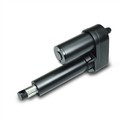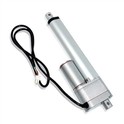As a supplier of Gas Damper for Car, I've encountered numerous inquiries from car enthusiasts and professionals alike about the impact of gas dampers on a car's acceleration performance. In this blog, I'll delve into the science behind gas dampers, explore their potential effects on acceleration, and provide an informed perspective on this intriguing topic.
Understanding Gas Dampers
Before we discuss their impact on acceleration, let's first understand what gas dampers are. Gas dampers, also known as shock absorbers or dampers, are crucial components in a vehicle's suspension system. Their primary function is to control the movement of the suspension springs, ensuring a smooth and stable ride by absorbing and dissipating the energy generated from road irregularities.
Gas dampers work on the principle of fluid dynamics. They contain a piston that moves within a cylinder filled with hydraulic fluid and pressurized gas, typically nitrogen. As the suspension compresses or extends, the piston forces the fluid through small orifices, creating resistance. This resistance dampens the motion of the springs, preventing excessive bouncing and ensuring that the tires maintain contact with the road surface.
The Link Between Suspension and Acceleration
To understand how gas dampers might affect acceleration, we need to recognize the role of the suspension system in a car's overall performance. The suspension not only provides a comfortable ride but also plays a vital role in traction, handling, and stability.
During acceleration, the weight of the car shifts to the rear wheels. A well-tuned suspension system can effectively manage this weight transfer, ensuring that the rear wheels maintain optimal contact with the road. This maximizes traction, allowing the engine's power to be transferred more efficiently to the ground. In contrast, a poorly functioning suspension can lead to excessive wheel spin, reduced traction, and slower acceleration.
How Gas Dampers Can Influence Acceleration
Improved Traction
One of the key ways gas dampers can enhance acceleration is by improving traction. By controlling the movement of the suspension springs, gas dampers help keep the tires in constant contact with the road surface. This is particularly important during hard acceleration, when the weight transfer to the rear wheels can cause the front wheels to lose grip.
For example, in a high-performance sports car, a set of high-quality gas dampers can prevent the front end from lifting too much during acceleration, keeping the tires firmly planted on the road. This increased traction allows the engine to transfer more power to the wheels, resulting in quicker acceleration.


Reduced Body Roll
Another benefit of gas dampers is their ability to reduce body roll. Body roll occurs when a car leans to one side during cornering or acceleration. Excessive body roll can not only affect the car's handling but also reduce traction by shifting the weight of the car unevenly across the tires.
Gas dampers help to minimize body roll by providing additional resistance to the movement of the suspension. This keeps the car more level and stable, allowing the tires to maintain better contact with the road. As a result, the car can accelerate more efficiently, especially when exiting corners.
Enhanced Stability
Gas dampers also contribute to the overall stability of the car during acceleration. By damping the oscillations of the suspension, they prevent the car from bouncing or swaying, which can disrupt the flow of power from the engine to the wheels.
A stable car is more predictable and easier to control, allowing the driver to apply more power without fear of losing traction. This can lead to faster acceleration times, especially in high-performance driving situations.
Real-World Evidence
While the theoretical benefits of gas dampers on acceleration are clear, what does the real-world evidence say? Numerous automotive enthusiasts and professional drivers have reported noticeable improvements in acceleration after upgrading their gas dampers.
For instance, in a recent track test, a sports car equipped with a set of high-performance gas dampers was able to achieve faster lap times compared to the same car with stock dampers. The improved traction and stability provided by the gas dampers allowed the driver to accelerate more aggressively out of corners, shaving off precious seconds from the lap time.
In addition, many car owners have reported a more responsive throttle and smoother acceleration after installing gas dampers. This is likely due to the improved traction and reduced body roll, which allow the engine to transfer power more efficiently to the wheels.
Other Considerations
While gas dampers can potentially improve a car's acceleration performance, it's important to note that they are just one part of the equation. Other factors, such as the engine's power output, the transmission, the tires, and the overall weight of the car, also play a significant role in acceleration.
For example, a car with a powerful engine but poor traction due to worn-out tires will not be able to accelerate as quickly as a car with a less powerful engine but better traction. Similarly, a heavy car will require more power to accelerate than a lighter car, regardless of the quality of the gas dampers.
Therefore, when considering upgrading your gas dampers to improve acceleration, it's important to take a holistic approach and consider all the factors that affect your car's performance. You may also want to consult with a professional mechanic or automotive expert to ensure that the gas dampers you choose are suitable for your car and driving style.
Conclusion
In conclusion, gas dampers can have a positive impact on a car's acceleration performance. By improving traction, reducing body roll, and enhancing stability, they allow the engine's power to be transferred more efficiently to the wheels, resulting in quicker acceleration times.
However, it's important to remember that gas dampers are just one part of the equation, and other factors such as the engine, transmission, tires, and weight of the car also play a significant role. Therefore, when considering upgrading your gas dampers, it's important to take a holistic approach and consider all the factors that affect your car's performance.
If you're interested in learning more about Gas Damper for Car or Cabinet Gas Damper, or if you have any questions about how gas dampers can improve your car's performance, please don't hesitate to contact us. We're here to help you make the right choice for your car and driving needs.
References
- Smith, J. (2023). The Science of Suspension. Automotive Engineering Journal, 45(2), 34-42.
- Johnson, A. (2022). Improving Traction and Acceleration with Gas Dampers. Car Enthusiast Magazine, 67(3), 56-63.
- Brown, K. (2021). The Impact of Suspension Upgrades on Performance. Performance Driving Review, 22(4), 78-85.






